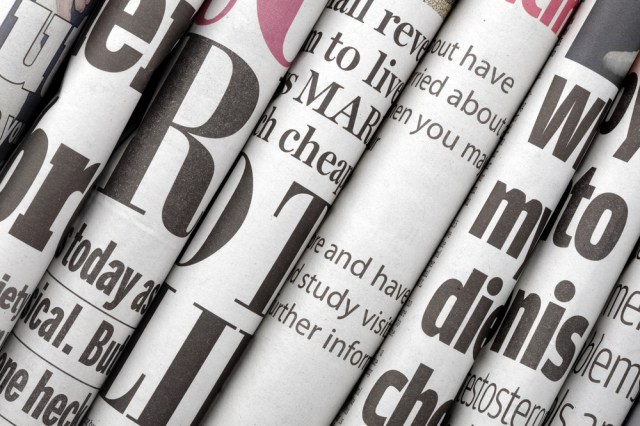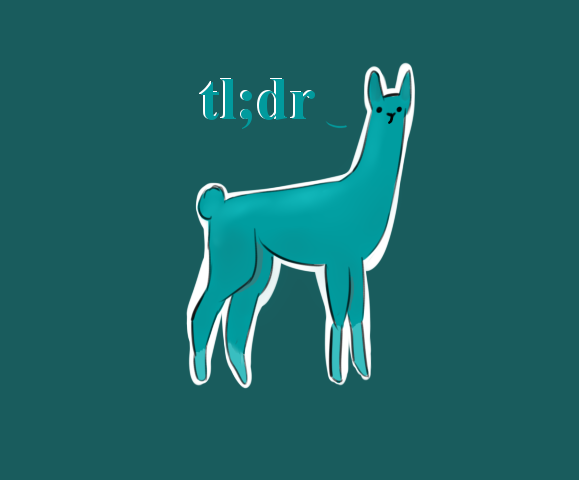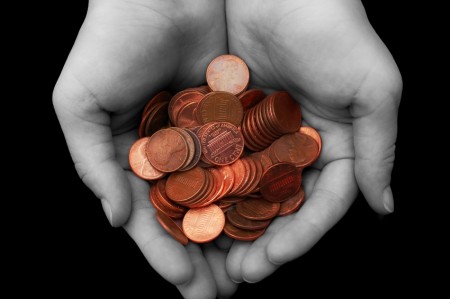The point of this piece, this entire long piece, is to convince you all, as a collective unit, to go out and subscribe to your state and/or local newspaper en masse if you have the means to do so. And you should do this because it is an act of rebellion.
Our collective girlfriend, Rachel Maddow, has asked us repeatedly to do this. Most recently, it was in response to The Star Ledger, New Jersey’s largest daily newspaper, undergoing cuts so massive that one almost can’t believe they’re happening. They began by laying off 34 of its employees (a figure that includes ten percent of its newsroom) last year. It certainly wasn’t because the reporters were bad at their jobs — in fact, the paper has won three Pulitzer Prizes and several national journalism awards in recent years. You might recognize The Star Ledger even if you don’t live in New Jersey due to their Herculean reporting on the Chris Christie Bridge Scandal (though the real Hercules award goes to The Record — more on that later). In the face of so much national attention, both The Star Ledger and NJ.com made another heartbreaking announcement this month — a parent company called NJ Advance Media is being formed so that smaller newspapers (including The Star Ledger, NJ.com, the South Jersey Times, The Times of Trenton and others) can better compete in this digital age. And cuts are continuing. 167 non-union employees at The Star Ledger will lose their jobs. In the newsroom of 156 people, 40 positions will be cut. That’s 26% of the newsroom. In this same move, NJ.com lost 15 of 77 employees (that’s 19%). Again, it’s not because they’re bad at their jobs. And it’s not because these jobs aren’t necessary for the kind of quality reporting they’re currently doing. It’s simply because in the age of giants like Facebook, ad revenue just isn’t flowing. And in the age of “free media,” subscribers are unwilling to pay for local news. Across the entirety of the fledgling NJ Advance Media, more than 300 layoffs just occurred.
I live in New Jersey. And I didn’t know about this problem until Rachel Maddow, a political commentator on national television who does not live in New Jersey, told me about it. I didn’t know about it because I don’t subscribe to my local paper.
I, too, am part of the problem.

Local Papers Do Important Work
State and local papers break news stories that have important national and even international implications — the first paper to break any sort of story about the George Washington Bridge closing was The Record, a daily newspaper covering Bergen County in New Jersey. The person who brought it to light? A traffic reporter — John Chicowski. It doesn’t get any more local than that. The Record‘s Shawn Boberg then broke the story that Port Authority officials were warned about the toll booth closures and did know what was going on. And then days later, the same reporter linked that story back to Chris Christie.
In an area I’m less familiar with, West Virginia, another national story’s been unfolding: The Elk Creek pollution case has focused the United States on the coal industry, on regulation for chemical storage and on who, exactly, is affected when MCHM leaks into the drinking water. But the task of informing local residents that they’ve been advised to not drink the water fell to local news outlets.
According to the Washington Post, state and local papers also broke stories about Connecticut Governor John Rowland‘s massive corruption, that South Carolina Governor Mark Sanford was not hiking the Appalachian Trail but visiting his mistress, and the ruptured Exxon pipeline in Mayflower, Arkansas.
And thank goodness for the local coverage of Wendy Davis‘s filibuster — no one would have known about it had it not been for the local papers, and it never would have taken off online like it did. The networks sure weren’t reporting on it.
It’s safe to infer that these stories break because the local reporters are there, entrenched in their community with years of experience on their beats. Boburg had been reporting on the Port Authority for years He had the institutional knowledge to spot something untoward and the connections to find out what it was and why.
According to a poll done in 2011 by the Pew Research Center, Americans rely on local newspapers but don’t think that they do:
On 11 of 16 topics that more than 2,000 respondents were asked about in January, newspapers and their websites ranked first or tied for first as a relied-upon source of local information.
But when asked if their local newspaper no longer existed whether that would have a major impact on their ability to keep up with information and news about their community, 69 percent of those surveyed said no.
The authors hypothesize that newspapers’ greatest strength is in civic topics like taxes or zoning and development that comparatively fewer Americans follow regularly.
While this poll is a few years old, one might argue that the number of layoffs in the reporting sectors point to a continuing trend. Not enough readers equals not enough money. Ad revenue goes elsewhere. And then we have the elimination of a resource that we, in our various local communities, still very much need.
So why is that perception there? Why do people think they don’t need their local paper anymore?

TL;DR Culture
I didn’t know what TL;DR meant for a really long time. An embarrassingly long time, actually. Only recently did I discover that it meant “too long; didn’t read.”
I’m sorry. What?
Much of the time we are on the internet precisely to read things — at least, I am. And I can guess you are — you’re reading this right now. And you made it this far (so far, you’ve gotten through approximately 1200 words. Congrats). But that’s obviously not the way the world works. According to Know Your Meme, TL;DR used to be used almost exclusively for calling out commenters or users on forums for the length of comments. But now some websites post a summary of their article or post under the heading TL;DR.
There’s a whole TL;DR culture that’s happening around us and we can all feel it — from the NPR April Fools Day joke that proved commenters didn’t read the post, even when short to this analysis of how to succeed in an era of shortening attention spans. Millenials purchase more books than any other generation, it’s true, and yet there’s a rise of Buzzfeed-style list posts (even ones from which we can ingest news). Studies show that our attention span is, indeed, shortening. I’m not saying lists are bad (we use them all the time), but I am saying diversity in the ways we ingest news is good.
One could argue that newspapers themselves were the early perpetrators of TL;DR — the style of writing for print news publications often dictates putting the point, most of the relevant information, in the first sentence or first paragraph. Hell, I did that here. I told y’all exactly what the point was, first thing.
We’ve become used to bite-sized news and I would argue that picking up a newspaper — actually feeling what a day’s worth of written news feels like in your hands — feels like an awful lot of commitment, even if individual articles are short and sweet and have a lot of relevant information packed into just the first line. Reading a newspaper means taking time that, in our increasingly speed-obsessed society, has become less acceptable to take. In an inforgraphic illustrating how social media is doing our attention span a disservice, one of the cartoons is literally holding a newspaper while making a confused face.
But I don’t think that’s the only reason newspapers are suffering.

Instant (Free, Personalized) Gratification
I love news blogs. Podcasts. Love love love them — the information is easily share-able and almost instantly accessible. This way of ingesting news enables me to cut the cord on my cable. It’s cheaper for me to exist, not paying for any of my news. And when it comes to blogs that specifically share my political leanings and whose research I trust, I know that I’m getting exactly what I want out of my talking heads and commentators. And it’s not just news blogs — I’m also able to get my news via word of mouth. Social media has done an amazing job of connecting communities (local and otherwise). Millenials trust user generated content 50% more than other types of media, meaning trusted news is more likely to come from a friend than a newspaper. That friend is more likely to share your opinions, your politics and they’ll know what you’re interested in hearing about. It sounds like a great deal, this word of mouth thing.
If one is never presented with ideas other than those similar to one’s own, one may never learn to properly articulate one’s own position — consider the act of debate team members researching the opposite point of view, or even arguing a point of view they don’t hold. A person never exposed to ideas other than those of their particular group or community may not learn to think critically about rumors or stereotypes (the echo chamber effect, or how everyone who watched Fox News exclusively truly believed President Obama was born outside the United States/didn’t think they were being racist). While it is much easier to not encounter opinions, view points or experiences that contradict our own, it does not make for good people or good citizens. State and local newspapers might have leanings or biases, same as all news outlets (journalists are always writing from their own position in the world, even in attempts to be impartial). Letters published by locals one might not agree with, dissenting opinions — all can be found within state and local newspapers. It also doesn’t make for good people to pay attention to only the news that directly correlates to our interests. It doesn’t make for good people to avoid news that scares us. Being exposed to articles about a wide variety of topics is also a major advantage of subscribing to your state or local paper.

Why We Pay For Media
But what about the pay-walls? What about those of us who don’t have the money to subscribe to a news outlet? Or what if your local paper is truly terrible and entirely unlike some of the dogged reporting highlighted earlier? I must acknowledge that I am speaking from a place of privilege, here — I have the means to subscribe to The Star Ledger or The Record. And not only do they exist, they’re excellent newspapers. I’m going to argue, though, that even if it’s hard to come up with that $6.95 per week, that we all try our best to do it anyway. And also that it’s okay if you can’t.
Paying for media inside our communities helps us sustain our communities — it means that local reporters are paid for the work that they do, and they spend that money within our communities. That’s good for our local and community economies — it’s the same reason we donate to Autostraddle (though we are spread out, we are a community and we like to see our community members prosper) or might subscribe to our upcoming A+. It means that the local paper will be there when we need it. We all, collectively, need to employ the people who report on issues important to us. And whether we like it or not, whether we relate to the general populace in the area where we live or not, those things happening in our most local sectors effect our lives immensely — even more immensely, usually, than national or international issues and news stories.

Why We Should Care About the Local Stuff
It’s easy to get swept up in the idea that your small town or your city or your whatever isn’t as important as what’s going on in the Federal government or with global warming or with whatever the hell that everyone else is focusing on right now. But it is — the carbon emission reduction from the decision to go forth with a green energy plan at the local high school or factory is a big deal. Large problems, environmental or otherwise, are made of up small community issues. It’s like Legos — small block, large structure. For example, back when I was in high school I took a political science class that required me to go to at least one town hall meeting. Looking back, most of it felt like the funniest parts in Parks and Recreation.
Except for one thing.
A woman stood for her turn to speak in the middle of the meeting. She reached into her purse and pulled out a mason jar full of brown water. Not, like, a little brown either. Like really brown. Like she got it out of a mud puddle and scooped in real deep to get a lot of the actual mud. “This is what’s been coming out of my faucet for three days.” There were a few other citizens who got up after her, all with similar jars of water, all really gross water. Apparently something had happened at a construction site in the neighborhood — the construction company denied anything had gone wrong. If memory serves, that town hall meeting forced an inspection. And the newspaper reporters who were there at the meeting? You bet they reported on the people with the jars of gross water.
The water that comes out of our faucets is really important and really local. No New York Times is going to cover it when it’s in small town, USA, yet it’s one of the most important things that I can personally think of. That and the air we breathe. Those are pretty necessary.
State and local issues have more hold on our daily lives than we collectively think. State and local elections give us more power than federal elections, and those state and local officials are usually making the decisions about who can construct where and who requires what kind of inspection and who pays when a house starts to fall down. State and local newspapers report on these candidates and issues.
There is, therefore, no doubt that state and local papers are hugely important to our ability to remain connected and aware to events that are directly affecting our health, well-being, freedoms and all sorts of small things. And we do need our state and local papers even if our fast-paced, personalized culture has convinced us we don’t. But one thing I haven’t covered yet, a thing I promised to prove in the first two sentences of this article, is why subscribing to our state and local newspapers is an act of rebellion.
Diversity In Media Keeps Us Free
By not subscribing to state and local papers, we are making it very very easy for a few corporations to create a monopoly over how we receive our information. C.J. Cregg does not approve:
https://www.youtube.com/watch?v=Lk6TjQLAhyA&feature=youtu.be
Though that clip is from a television show, this is something that is legitimately already happening. A few large corporations own most of where we get our news from — this gives control over what gets covered, when and how to the very few (with money) instead of to the many. If one company doesn’t think you should know something, if just one CEO has a stake in fracking or big oil — how are we to know that’s not effecting the way that issue is being portrayed through all their outlets? If just one CEO gave money to a political campaign, how are we to know that an unwillingness to report on that politician’s bad behavior hasn’t spread to multiple news channels and newspapers and websites?
And make no mistake — journalists and journalism are important to our execution of democracy. Without our eyes on him, Chris Christie would have been able to close those lanes or basically sell pieces of the Twin Towers in exchange for endorsements and manipulate the system even more than he already has without consequence. Government requires journalists to function correctly — government at all levels, in all corners of the United States. We need watchers, journalists and people who care everywhere or we’re gonna get screwed.
Here is how you know local journalists are badasses and dangerous for those in power. Watch until the very end, it’s the last part that’s the most interesting:
Note the part where they talk about David Wildstein purchasing the domain name ShawnBoburg.com and redirecting it to his competitor (yes, The Star Ledger, yes another paper I advocate for). Apparently this kind of behavior’s happened before:
According to reporting in The Record, Wildstein has made a habit of buying the Web addresses of people who cross his path in New Jersey politics — including the Democratic candidate for lieutenant governor in 2012 and a mid-level official at the Federal Aviation Administration who helped forge a firefighting agreement with the Port Authority that Wildstein disliked. While he was at the Port Authority, Wildstein bought the online names of New York Gov. Andrew Cuomo’s top appointees to the agency, including Executive Director Pat Foye, who sounded the alarm about the Fort Lee scheme. Wildstein’s redirect on PatFoye.com sends visitors to the Web site of the New York Yankees.
Though childish and kind of pointless, renegade political appointees only behave this way if they feel that someone or something is threatening to them in some capacity — in this case, Boburg is extremely threatening to the existing New Jersey power structure; a structure that in the case of the Christie office, is seriously corrupt.
So yes, subscribing to a state or local newspaper is an act of rebellion — we are directly preventing the monopolization of information, especially in cases like The Record:
The cuts have had impact everywhere — who knows what important news is going unreported? — but given that the last big government corruption bust in New Jersey required buses to haul away all the suspected perpetrators, the loss of journalists at The Star-Ledger and elsewhere is a scary prospect.
In that context, The Record is an increasingly endangered and valuable species. As chain owners have denuded local newspapers of muscle, The Record, a family-owned business, has managed to avoid the wholesale cuts that have decimated other newspapers. It helps to have dedicated ownership: Started in 1895, The Record has been owned since 1930 by the Borg family, which has called all the shots.
The family has made sure that the newspaper is a source of accountability and high-quality information. About 200 people, including 85 reporters, work in the newsroom of The Record.
It’s contributing to the radical notion that our government, at all levels, should be held accountable. And it’s making sure members of our communities are paid fairly for good work. A radical notion, indeed.
I began this post with no state or local newspaper subscriptions. I now have one — The Star Ledger.








Comments
Except in my case, as in many of yours, where those local papers are also owned by subsidiaries of the big monopolies. I’m generally for the idea, but making sure you are actually getting the real local deal and not the printed version of web bias is super important or you are defeated before you start. Here there isn’t a local paper that isn’t owned by a media giant and I don’t even live in that big of a town.
Oh no, they’ve gotten you already!
Daaammmnn. As I was reading this, I got Zebra Katz’s “Imma Read” stuck in my head, as in: you are totally reading the community on this, you are totally reading me on this. NICELY DONE. I needed it, thank you. Going to subscribe next payday.
Thank you! Your local economy thanks you too!
RIGHT ON! It’s telling that a protest in my corner of NorCal has led to a lawsuit–instead of arresting the treesitters and those chained to equipment, police handcuffed the news photographer and seized his camera in an attempt to quiet the story. Exactly why everything you said here is true, and so important. (P.S. I’m a subscriber! The choir appreciates your sermon!)
Are you talking about Willits?
There’s the important reasons mentioned in this article to read a local paper, and then there’s the fact that I just found out about a book sale on my college campus that I didn’t hear about until I saw it on the paper’s “events” sidebar. (university library sale where everything’s one dollar!) That’s a pretty compelling reason for me, haha!
I’m a journalist who wants to break stories like this (I have to dream!) and this have me the warm fuzzies.
Just FYI, if your local paper isn’t covering stuff that’s important to you, tell them! Before things happen, if possible, or ASAP once they do. A pro/con to smaller news staffs is that we are more open/desperate for content and sending the right person the right info really can go a long way.
But, please don’t be mad if the story gets delayed or isn’t on the front page, the reporter you talked to probably also wanted it on the front page!
Just, support local news guys. We love that you read us and write us off the wall letters and tell us about random stuff going on.
<3
Gave me the warm fuzzies. Wow. It’s a good thing I don’t have to write articles on my phone…
Omg, I should have included participating in your local newspaper WHY DIDN’T I DO THAT?! Thank you for you comment. :0)
great piece, ali!
Thank you! <3
i love this, ali. if it helps, my grandma subscribes to BOTH the star-ledger and the record. BOTH!
PS — dc has no local papers you can subscribe to, but i make an effort to read them as much as possible anyway so that i can break out of my feminist world and see the real world. i hope you’re proud.
1. Your grandmother sounds awesome.
2. Always proud, no matter what!
TL;DR
(Kidding. Seriously though, subscribing to the local paper would make me feel bad about how much paper is being wasted when they also publish it online)
And regarding TL;DR: I was just thinking earlier today about how awesome it is that AS articles tend to have multiple pages, with word counts that reach the thousands. It makes me so happy, and I feel like it really sets this site apart from most digital news sources.
You know, I actually had a whole section about the environmental aspect of this and I cut it because it wasn’t coming together. It basically said get behind the paywall if the paper part of newspapers isn’t your thang, but it also said that for me- I spend so much of my day looking at a screen that the paper subscription was important when I signed up. I’m just always terrified that if I do everything virtually, that I’ll live a virtual life. For me, the paper is important and I will continue to tread lightly on the earth in other ways.
I feel like you’ve crystalized many of my fears about news monopolies, the ones I haven’t been able to articulate properly. The “echo chamber” effect is completely spot on.
Those are some extremely sobering statistics about our fellow writers in print. I’ll definitely be looking into a paper subscription.
Thank you for writing this! The Sunday paper is always welcome at my door. I love waking up to the thud of the my newspaper on the sidewalk. Reading the paper gives me the opportunity to unplug from all the devices and indulge in pure print. Everything from national news to the local art scene to recipes I’ve turned in to regular dishes in my house are the little gems waiting for me every Sunday morning. I highly recommend it!
Aaaaah! I disagree with this SO. MUCH. Newspapers are businesses that exist for the sole purpose of making money for its owners (in the case of Advance, owners of the Star Ledger) or shareholders (ie NYTimes). If you truly believe that news is a public go
Damn mobile site posting my comment before I was done…
As I was saying, if you truly believe that news is a public good, which I do, support the nonprofit news organizations in your area, publi radio, NPR and Pro Publica. The news pegs leading the Wendy Davis coverage is a great example of why this is necessary.
Besides, the whole reason newspapers are in the shape they are is because for much of the 90s and te beginning of the 00s, these corporations sought profits instead of quality and drove themselves into the ditch.
I grew up in a newspaper family and have seen this industry from every angle. Don’t treat it like a charity.
Maybe the owners/publishers see it that way, but every reporter/writer I’ve met was/is doing what they do because they want people to be informed; believe the public has a right to know about what’s going on in the world, etc.
I totally agree. I’ve been one of those reporters. They do good work, but at the end of the day, that work is a product that is being sold and the profits go to the owners and shareholders and never to the reporters. This article frames subscribing to a newspaper as an altruistic act to support communities and reporters, when it will actually just line the pockets of the Newhouse family, who own Advance and the Star Ledger.
If you want to subscribe to the Star Ledger because you want to read their news on paper every morning, by all means do it. But don’t do it because you think that’s the only way to support thorough reporting on local issues.
I super appreciate this perspective. Thank you so much for contributing to this discussion!
I will add to this…
Based on the business model newspapers are working on is based on something that worked well in the 80s and 90s and subscribers aren’t a huge part of that. The move to put news online for free isn’t what decimated the industry; it’s the refusal to put classified ads online in the 90s, so Craig Newmark did it first, and for free. Meanwhile, the consolidation of car dealerships, supermarkets and department stores has also reduced ad revenue. Free online news is just a scapegoat for two decades of bad decision making on their part.
So again, if you do subscribe to your local paper, know that you aren’t contributing to the bottom line. You’re just paying for the paper the news is printed on. And even if the thousands of subscribers who have left over the last 20 years all came back, the business model is so outdated, it wouldn’t really make a difference.
This reminds me of the recent debate in Scotland on independence and about how the pro-independence side have very, very little support from the (usually English owned) local print media so they’ve had to resort to publishing online on websites like Wings over Scotland and Bella Caledonia (which are now read by more people than a lot of newspapers). So, yeah, support local newspapers but first make sure that they really look out for local interests.
Our house always buys the local paper (Belfast Telegraph)because no other paper covers local affairs like it does but the reporting in it has got really sensationalist. I read more autostraddle than I do of it
Thank you for this!! I am a reporter for a local newspaper in a suburb of Chicago and our staff works very, very hard at reporting on everything going on here. I’m at every single city council and plan commission meeting here (as well as a lot of school/library/senior center/nature center events). Although our business model is different than other newspapers (we send our newspapers to every home and business in our city for free – it’s supported mostly by advertising, and our website has a paywall), we still want our readers to read our newspaper and know what’s going on in their backyards! Support your local news, y’all!
Our local newspaper is ultraconservative and is created by people who are out as homophobes, so I don’t think I’ll be subscribing to them. However, there is a local newspaper in Detroit that is run by queer AA and I will fully support them.